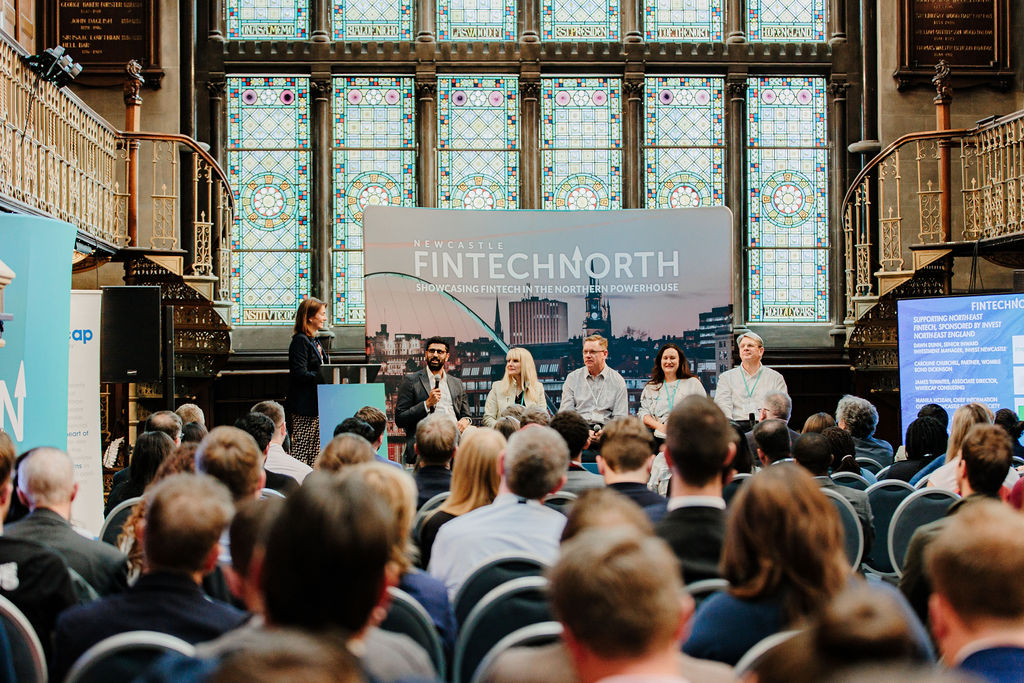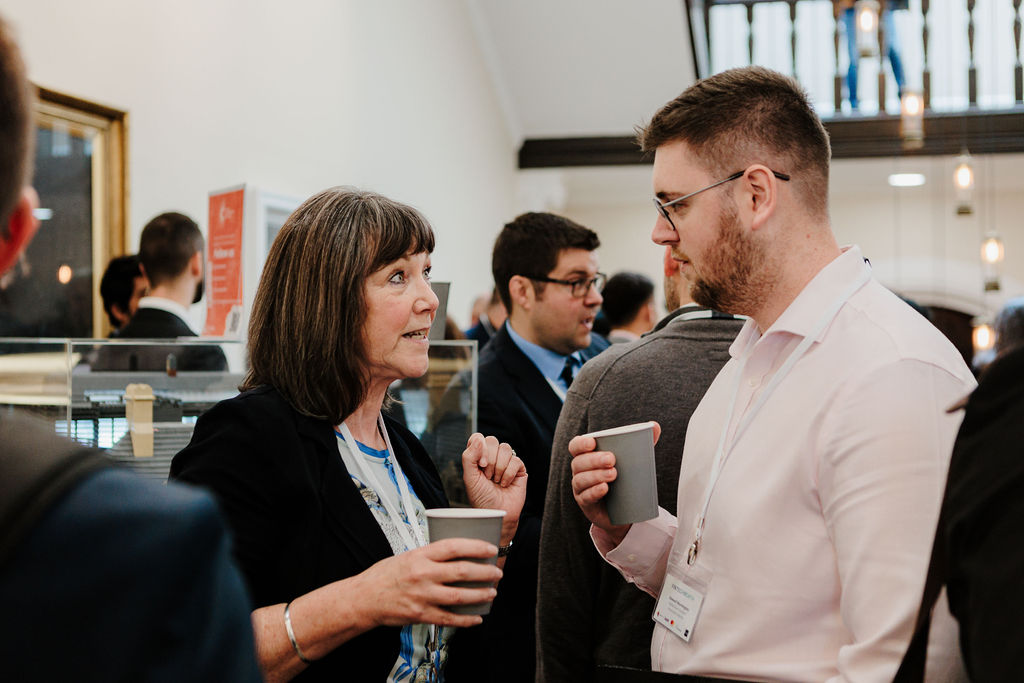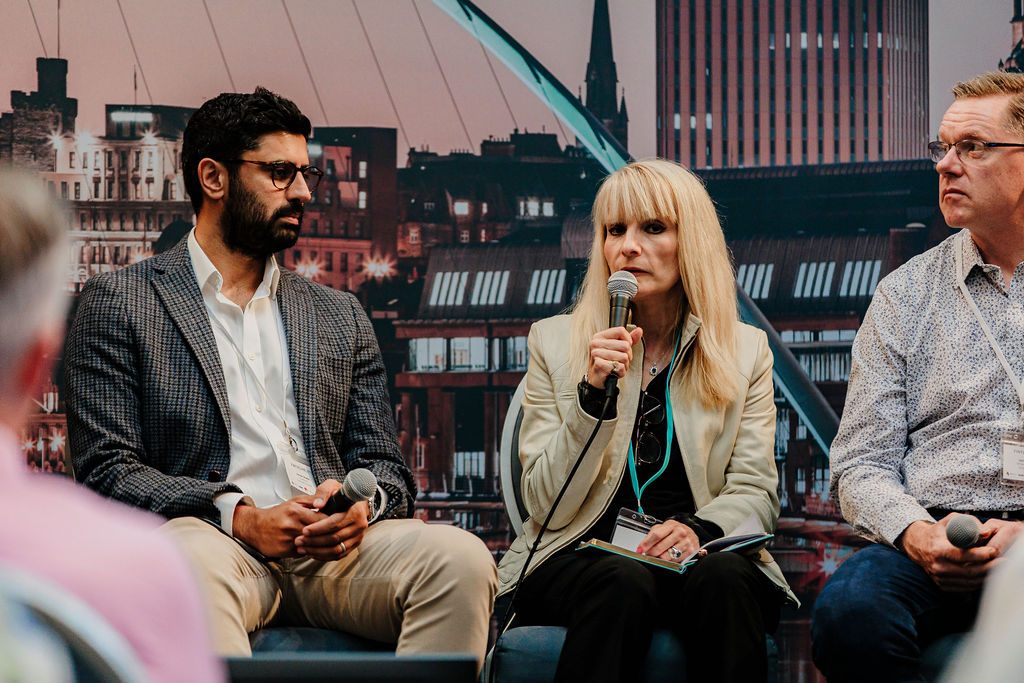FinTech and LegalTech Funding Forum Write-up
On the 19th of September, FinTech North , in partnership with Squire Patton Boggs, LegalTech in Leeds and West Yorkshire Combined Authority ran a private FinTech and LegalTech funding forum at Squire Patton Boggs’ event space in Leeds, where an array of organisations looking to fundraise heard from Venture Capitals (VC’s) in a highly engaging reverse- pitch style session.

Partner Welcomes
Following a vibrant networking lunch, attendees were welcomed by Paul Anderson, Partner at Squire Patton Boggs, who then handed over to Joe Roche, FinTech North’s General Manager. Joe thanked Squire Patton Boggs for their support and hosting, along with the other event partners.
He prefaced the event by noting the importance of ‘demystifying the journey to funding’ and highlighting the event’s aims to foster connectivity between investors, funders and businesses looking to fundraise.
He then provided a short overview of FinTech North, its recent strategy and aims, upcoming events, and an overview of the Northern FinTech landscape.
Chloe Thompson, Consultant at Whitecap Consulting and Board Member of LegalTech in Leeds then provided a welcome and overview of LegalTech in Leeds. She referenced Whitecap’s regional strategy reports, noting that LegalTech in Leeds was born out of a need to connect the strong legal and technology sectors in Leeds.
Tom Purvis, Inward Investment Manager at West Yorkshire Combined Authority (WYCA) was next to share a welcome message and an overview of the region from an inward investment perspective. He made reference to the 30th Anniversary of the Enterprise Investment Scheme, shared statistics about the prominence of the technology sector in the region, and noted that West Yorkshire has the highest number of scale ups in the UK outside of London.
He went on to highlight the goals of WYCA to support regional growth through various means including making connections and bringing the right people together through their strong network, helping organisations to access finance and their work in the skills space, with aims to ‘close the productivity gap.’
VC Reverse Pitching Session
First to speak in the reverse-pitching session was Nomaan Riaz, a representative of one of the most active investors in the UK, Mercia Ventures, who emphasised the importance of expanding equity investments outside of London.
Mercia Ventures operates across the UK and focuses on sector-agnostic investments, and is determined to establish a strong presence in the regions beyond the capital. Nomaan explained that the firm’s investment approach spans consumer, life sciences, software, and deeptech, catering to companies at various stages of growth.
When discussing what makes companies attractive to investors, Nomaan highlighted the importance of knowing where a business stands in its start-up journey. Founders need to be “investment-ready” before approaching potential investors. Transparency, strong pitch decks, and legal advice are critical factors in ensuring a smooth investment process, which typically takes between three to six months. The investment process is highly selective, with only a small percentage of pitches turning into live transactions.
Next to speak was Stephen Cardwell, partner at Anticus Partners. Anticus Partners based in Barnsley, manages the Finance Yorkshire equity streams and has invested £50 million in 48 companies across the region. They focus on supporting tech companies, through the Finance Yorkshire Growth Fund and The Finance Yorkshire Seedcorn Fund.
One of Anticus Partners’ key value propositions is its ability to engage with companies across the region and help scale them by building teams and co-investors. Anticus Partners doesn’t just provide financial backing but also acts as an advisor and mentor to founders, forming strong relationships and supporting the scaling process.
The investment process at Anticus Partners typically takes 4-6 months, depending on how prepared the company is. Preparedness is key, as the firm conducts a rigorous two-stage due diligence process. Anticus Partners also differentiates itself by entering the market early, especially on the tech side, helping build teams and open networks for co-investors. This proactive approach allows them to be more involved in shaping companies from the ground up.
Following this, Jess Jackson, Investment Manager at Praetura Ventures came to the stage. She shared that Praetura Ventures has made it their mission to address the lack of funding options for founders in the Northwest of England. Since 2011, Praetura Ventures has focused on supporting early-stage companies and diverse founders. They aim to bridge the gap in funding between the North and the more London-centric market. Praetura Ventures’ investments range from £150k to £5 million, and they are particularly active in pre-seed funding, nurturing early-stage ideas before following on with more capital.
Transparency is central to Praetura Ventures’ investment process. They offer an “operational partners program” to ensure founders have access to key networks and resources. Praetura Ventures emphasises the importance of companies understanding their business model and market before seeking investment. They pride themselves on providing feedback quickly, with an aim to respond to pitches within three working days.
She advised that in a challenging market, where the economic landscape has shifted dramatically, companies must research and approach the right investors, matching their sector and investment size.
Keith Benson, Partner at DSW Ventures them outlined their approach to early-stage investments, focusing on pre-Series A and pre-seed deals. Their investments typically range from £200k to £1 million, and they make around 5-7 investments per year. Unlike some higher-volume investors, DSW Ventures operates with a low-volume, high-engagement strategy, contributing significant time to each investment. Commercial due diligence is a key part of their process, ensuring they invest in scalable services, software, and science-focused companies.
DSW Ventures is also committed to building better businesses through creative disruption, focusing on societal impact and value creation. Keith pointed out some common pitfalls in early-stage pitches, particularly when companies fail to clearly explain their value proposition, market, or competition. DSW Ventures prefers companies with part-built products, as traction is difficult to establish with entirely pre-product companies. He noted that founders must also ensure their pitch decks are concise and clear, addressing key points such as market fit and defensibility.

Last to pitch was Jordan Dargue, Founder of Lifted Ventures, who highlighted the significant disparity in funding for female founders, with only 2% of capital being allocated to women-led businesses. Lifted Ventures aims to address this by increasing the flow of capital into female-led startups and making the North of England the “gender-smart capital” of the UK. Their focus is on early-stage companies, offering smaller but more frequent investments through their mixed and women-only angel network.
Lifted Ventures is committed to ensuring every founder who applies gets personalised attention, offering a half-hour conversation to discuss their business proposition. This approach emphasises not just investment, but also education—helping founders stress-test their business models, refine their propositions, and ensure they are market-ready.
Jordan underscored that diversity drives performance, pointing to research that female-led fintech companies deliver 2.7 times higher returns and tend to exit quicker than male-led businesses. This focus on promoting the business benefits of diversity is part of Lifted Ventures’ broader mission to empower underrepresented founders and create lasting impact in the investment ecosystem.
Legal Advice
Hannah Crosland Corporate Partner and Josh Astill-Headley Senior Associate Solicitor at Squire Patton Boggs then came to the stage to discuss investor-readiness from a legal perspective.
They emphasised the importance of due diligence from both a legal and commercial standpoint. They noted that investors need to evaluate the credibility and growth potential of a company, and transparency is essential in ensuring a smooth relationship between founders and investors.
They went on to advise that businesses should be proactive about securing ownership of their intellectual property, trademarks, and domain names, as these can become significant obstacles later in the investment process.
Additionally, founders should pre-define shareholder and share capital arrangements to avoid complications down the line. They concluded that transparency throughout the legal process helps expedite the investment journey and strengthens investor confidence.
The Funding Forum provided a wealth of insights into the funding landscape for FinTech and LegalTech companies. Key themes included the importance of preparedness, transparency, and a well-constructed business model. Investors are not only seeking financial returns but also looking to build strong relationships with founders and support the scaling of their businesses. Whether through regional investments, promoting diversity, or providing educational support, the forum emphasised that early-stage companies must be equipped with the right tools, networks, and confidence to succeed in today’s competitive investment market.



